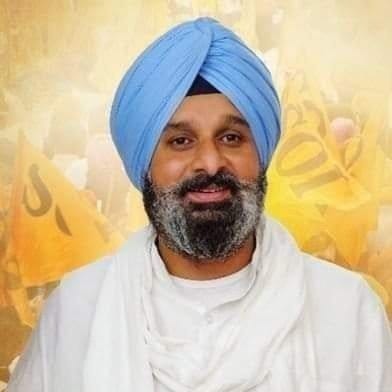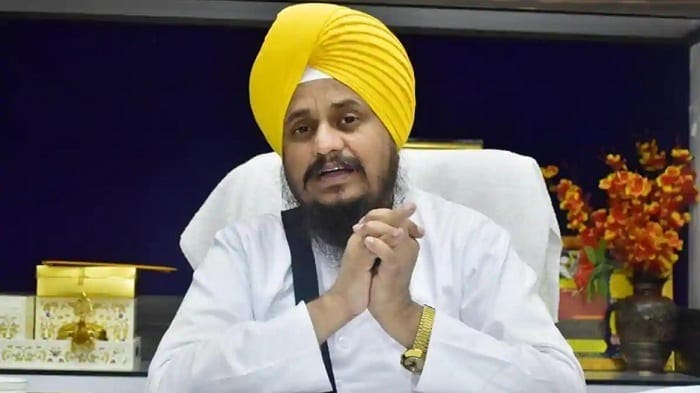NSA Revoked for Amritpal Singh's Cohorts, But No Relief for Him Yet: A Legal and Political Analysis
The 'mini-parliament' of the Sikhs has now lost its moral authority, if not its legal mandate, to govern and administer historic Sikh gurdwaras and provide broader panthic guidance and direction.
NSA Revoked: Punjab Government's Move
In a significant development, the Punjab Government has revoked the National Security Act (NSA) against seven key associates of Amritpal Singh, who were detained in Dibrugarh Jail, Assam. This marks a major shift in the legal approach toward these individuals, who were previously held under preventive detention. However, this does not signal their release, as they will now face formal arrest in connection with FIR No. 39/23, registered on February 24, 2023, at Ajnala Police Station in Amritsar district under Sections 307 (attempt to murder), 323 (voluntarily causing hurt), 148 (rioting, armed with a deadly weapon), 149 (unlawful assembly), and sections of the Arms Act.
Ajnala Police Station Attack: The Trigger Event
The case dates back to February 23, 2023, when Amritpal Singh, along with hundreds of his supporters, stormed the Ajnala police station in Amritsar district, demanding the release of his associate, Lovepreet Singh alias Toofan. Armed with swords, sticks, and allegedly firearms, the mob clashed with police, ultimately forcing Toofan’s release.
A particularly controversial aspect of the incident was the manner in which Amritpal and his followers carried the 'Swaroop' (physical manifestation) of Sri Guru Granth Sahib—universally regarded by Sikhs as the living Guru—as a kind of shield while advancing toward the police station. This act, widely seen as an exploitative misuse of Sikh religious sentiment, attracted widespread condemnation from a cross-section of the Sikh community, including religious scholars, Panthic leaders, and common devotees. At the same time, the Punjab Police was commended for exercising extraordinary restraint, ensuring that no harm or injury could potentially be caused to the sacred Granth Sahib. This careful handling of the situation prevented what could have been an explosive confrontation with grave religious and communal repercussions.
Following the attack, the Punjab Police registered an FIR on February 24, 2023, booking over 200 people under serious charges, including attempt to murder (Section 307 IPC), voluntarily causing hurt (Section 323 IPC), rioting while armed with deadly weapons (Section 148 IPC), unlawful assembly with a common object (Section 149 IPC), possession and use of illegal firearms (Sections 25, 27, 54, and 59 of the Arms Act), and obstructing a public servant in the discharge of duty (Section 186 IPC). Despite the gravity of the charges, Amritpal Singh was not immediately arrested, raising serious questions about the delay in action and the apparent lack of urgency in tackling what was widely perceived as an open challenge to law and order.
Amritpal Singh: No Reprieve Yet
While his associates will now be formally arrested in connection with the Ajnala Police Station storming case, Amritpal Singh remains behind bars under NSA, which, by law, cannot be extended beyond April 23, 2025. However, it is unlikely that he will walk free. He has already been booked under an FIR (dated October 9, 2024) under the Unlawful Activities (Prevention) Act (UAPA) for conspiring for and masterminding the murder of a YouTuber, Gurpreet Singh, despite being in high-security detention in Dibrugarh at the time. Given the stringent nature of UAPA, securing bail will be a challenge as the law places the burden of proof on the accused to establish prima facie innocence.
Adding to the intrigue, the superintendent of Dibrugarh Central Jail, Nipen Das, was booked under the Unlawful Activities (Prevention) Act (UAPA) for allegedly providing, allowing, or facilitating access to unauthorized communication devices and electronic equipment inside the high-security prison. A raid conducted in February 2024 led to the seizure of a spy-camera pen, a smartphone with a SIM card, a keypad phone, a TV remote with a keyboard, pen drives, Bluetooth headphones, speakers, and a smartwatch from Amritpal Singh’s cell, raising serious concerns about how such items were smuggled in and what communications may have taken place.
Suspicious Circumstances: A Political Fix-Up?
Several questions remain unanswered regarding the handling of Amritpal Singh’s case, raised by radical elements and some proponents of conspiracy theories:
Delayed Arrests: Why were Amritpal and his associates not arrested immediately after the Ajnala police station attack? Amritpal remained at large for 36 days before he was finally apprehended on April 23, 2023.
Elusive Fugitive: How did it take so long to apprehend him despite his high-profile activities?
Murder Conspiracy from Jail: How could Amritpal Singh conspire to murder someone while being held in a high-security prison in Dibrugarh?
Unauthorized Equipment: How did sophisticated communication devices, including a spy camera pen and a smartphone with a SIM card, reach his jail cell?
Political Angle: Is this legal action being used to spook the Hindu community in Punjab into shifting political allegiance towards the BJP and RSS?
The Broader Sikh Political Crisis
Amritpal Singh’s legal battle unfolds amid an ongoing crisis in Sikh Panthic politics. The SGPC’s truncated executive committee recently removed Jathedars of three Takhts, sparking internal dissent. Today, on March 17, 2025, the SGPC executive committee is reconvening to address various panthic issues, including budgetary allocations. Simultaneously, Damdami Taksal and Buddha Dal Nihang factions have separately rejected the new appointments of Jathedars, fuelling further discord.
Bikram Majithia’s Strong Criticism of the SGPC Executive Committee’s Decision
Shiromani Akali Dal (SAD) leader Bikram Singh Majithia had, the very next day, strongly criticized the decision of the SGPC Executive Committee to summarily remove two Jathedars, calling it an arbitrary and destabilizing move. His written and signed press note has added a new dimension to the already simmering tensions within the Sikh Panth, SAD, and the SGPC, as well as the larger political landscape of Punjab. The unilateral decision to replace the Jathedars has triggered widespread debate within Sikh religious and political circles, deepening the existing rifts.
Majithia’s statement underscores the growing divide within the SAD leadership and its relationship with the SGPC and Sri Akal Takht Sahib. His stance could further complicate the power struggle within SAD, which is already grappling with internal dissent, and could potentially weaken its historical hold over the SGPC and Sikh religious institutions. As factions within the Panthic community, including the Damdami Taksal and Buddha Dal Nihangs, reject the new Jathedar appointments, the controversy threatens to further erode the credibility of the SGPC and its decision-making authority.
Bikram Majithia’s Legal Woes
Even as he takes a strong position on Panthic matters, Bikram Majithia is simultaneously battling serious legal troubles. The senior SAD leader is expected to appear before the Special Investigation Team (SIT) on March 17 (today) and 18, 2025, in connection with the Punjab Government’s plea in the Supreme Court of India to cancel his bail in an NDPS case. The Punjab and Haryana High Court had granted him bail, but the State Government has accused him of non-cooperation, leading to fresh scrutiny of his legal standing. The outcome of this case could have major political implications, particularly for SAD’s electoral prospects and its leadership dynamics, as Majithia remains one of the party’s key figures.
Political Cross-Currents in Punjab
SAD's Internal Rebellion: Shiromani Akali Dal (SAD) faces internal challenges, with key leaders opposing party decisions.
Bharti (new membership drive) on March 18: Akal Takht's mandated recruitment of new SGPC members is set for March 18, adding another layer of uncertainty.
Leadership of the Dissidents: This remains an ambiguous factor, as does the question of whether they will align with Bikram Singh Majithia, who has maintained a calculated silence following his earth-shaking press note.
AAP Government’s Third Anniversary: Even as the political turmoil continues, the AAP government in Punjab completes three years in office. Amid speculation about leadership changes, AAP supremo Arvind Kejriwal has categorically reaffirmed Bhagwant Mann’s position as Chief Minister.
Giani Harpreet Singh’s Whirlwind Tour: A Polarizing Campaign
The unceremoniously removed Jathedar, Giani Harpreet Singh, who was ousted on grounds of moral turpitude following a hasty SGPC-mandated inquiry, is undertaking a whirlwind tour across Punjab, addressing a series of conferences where his sharp and unrelenting criticism of both Sukhbir Badal’s faction of the Shiromani Akali Dal (SAD) and the SGPC, which remains firmly under Badal’s control, has taken centre-stage. His fiery speeches are increasingly shaping Panthic discourse, challenging the legitimacy of the current SGPC leadership and exposing the deepening rift within Sikh religious and political circles.
However, as his rhetoric grows more confrontational, an increasing number of observers feel that he should adopt a more dignified and measured approach, despite the relentless trolling and character assassination campaigns targeting him. Moreover, the emergence of Bikram Singh Majithia as a potential rallying point for Panthic unity has, to some extent, diminished both Giani Harpreet Singh’s charisma and his perceived political influence. As the power struggle within Panthic ranks intensifies, it remains to be seen whether Giani Harpreet Singh can sustain his momentum or if the shifting political alignments will overshadow his influence.
Summing Up and Looking Forward: A Fluid Situation
The revocation of NSA for Amritpal Singh’s associates signals a shift in the Punjab Government’s approach, which, by necessity, cannot be out of sync with that of the Central Government. However, this should not be mistaken for leniency toward Amritpal himself. With a UAPA investigation looming over him, his legal battles are far from over, and the likelihood of his release remains slim.
At the same time, Sikh political institutions remain in turmoil, and Punjab’s broader political landscape is highly fluid. As these events unfold, his father, Bapu Tarsem Singh, is making concerted efforts to mobilize rural support in favor of his political outfit, Waris Punjab De. However, the current traction pales in comparison to the near-tsunami wave of support that catapulted Amritpal Singh to victory in the 2024 Lok Sabha elections from Khadoor Sahib constituency. Whether this political momentum can be revived or if Panthic politics is moving in a different direction remains an open question. The coming months will be crucial, not only in determining Amritpal Singh’s fate but also in shaping Punjab’s political future.
Call for Early SGPC Elections
In summary, we reiterate our demand and prescription for early SGPC general elections, which have not been conducted since 2011. The 'mini-parliament' of the Sikhs has now lost its moral authority, if not its legal mandate, to govern and administer historic Sikh gurdwaras and provide broader panthic guidance and direction. Conducting fresh elections is imperative to restore credibility and legitimacy to this vital institution.
We urge the Ministry of Home Affairs, the Punjab Government, and the Sikh Gurdwara Election Commission to facilitate early, free, and fair SGPC elections, conducted on a non-political party and non-ECI-symbol basis, ensuring that Sikh religious institutions remain independent of partisan interference.
Furthermore, all Panthic and Sikh organizations, along with influential Sikh personalities in India and abroad, must unite in a common call for immediate SGPC elections. A collective and resolute demand for electoral transparency and accountability is imperative to restore the rightful authority of the Sikh Panth in governing its historic religious institutions—a right earned through immense sacrifices during the colonial era, when Sikhs valiantly freed their sacred shrines from the clutches of corrupt mahants. It is now time to safeguard that legacy and ensure that the administration of Sikh gurdwaras remains in the hands of the Panth, as envisioned by those who struggled for their liberation.
Detained without trial: Examining the Evolution of Preventive Detention in India
Preventive Detention — the basic concept







